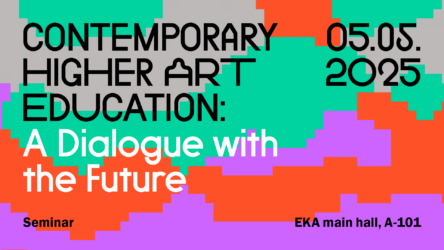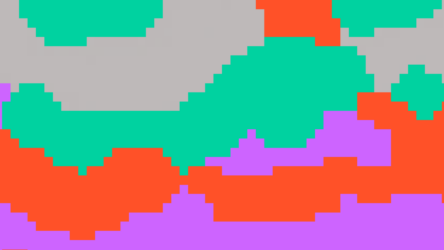Open Lectures
30.05.2025
Textiles 110: Open Lecture by Bart Hess “Future Bodies”
On May 30, at 3 p.m in EKA White House
The work of Bart Hess is of the most tactile and intuitive nature. Crossing boundaries between design, fashion and art, his oeuvre is a series of studies into materiality, (virtual) reality and technology. He is fascinated by the human body, which he tends to cloak in ways that have little to do with styling or fashion but more so with performance art and science fiction. Hess makes material studies, (animation) video’s and photographs with the relationship between man and material, nature and technology at the centre. In his work he’s looking for the tension between attraction and repulsion when exploring the intimate relationship that materials have with our skin.
Textile 110 is a series of events celebrating the 110th anniversary of EKA’s textile design education, as part of which a series of open lectures focusing on textiles will be held, a series of publications will be published, and a selection of works from the EKA Museum’s textile collection can be seen throughout the year.
The lecture series opens up the spectrum of diverse opportunities in the field of textiles, both in design, industry, and creative practices, bringing out different roles and methods of creation in the field through various invited guests.
Supported by the Research Fund of EKA and the Cultural Endowment of Estonia
Textiles 110: Open Lecture by Bart Hess “Future Bodies”
Friday 30 May, 2025
On May 30, at 3 p.m in EKA White House
The work of Bart Hess is of the most tactile and intuitive nature. Crossing boundaries between design, fashion and art, his oeuvre is a series of studies into materiality, (virtual) reality and technology. He is fascinated by the human body, which he tends to cloak in ways that have little to do with styling or fashion but more so with performance art and science fiction. Hess makes material studies, (animation) video’s and photographs with the relationship between man and material, nature and technology at the centre. In his work he’s looking for the tension between attraction and repulsion when exploring the intimate relationship that materials have with our skin.
Textile 110 is a series of events celebrating the 110th anniversary of EKA’s textile design education, as part of which a series of open lectures focusing on textiles will be held, a series of publications will be published, and a selection of works from the EKA Museum’s textile collection can be seen throughout the year.
The lecture series opens up the spectrum of diverse opportunities in the field of textiles, both in design, industry, and creative practices, bringing out different roles and methods of creation in the field through various invited guests.
Supported by the Research Fund of EKA and the Cultural Endowment of Estonia
29.05.2025
Open Lecture: Oona Libens
Oona Libens
29.05 17.00 B-305
NAUSEA – performance and lecture
Oona Libens is a swedish-belgian visual and performance artist. Her work revolves around the history of the (moving) image and media-archeology. Using simple components such as light, shadows, and analog projections, she illustrates scientific subjects, providing a tactile screen experience with shadows and refractions that animate the entire space. Her performances become a mixture of object theatre and film. The audience gets to see how the images are being created and manipulated live.
Open Lecture: Oona Libens
Thursday 29 May, 2025
Oona Libens
29.05 17.00 B-305
NAUSEA – performance and lecture
Oona Libens is a swedish-belgian visual and performance artist. Her work revolves around the history of the (moving) image and media-archeology. Using simple components such as light, shadows, and analog projections, she illustrates scientific subjects, providing a tactile screen experience with shadows and refractions that animate the entire space. Her performances become a mixture of object theatre and film. The audience gets to see how the images are being created and manipulated live.
21.05.2025
Open Architecture Lecture: Mark Cavagnero
On Wednesday, May 21st at 18:00 in the EKA Auditorium,
a world-renowned architect Mark Cavagnero will share his thoughts and experiences in a lecture titled:
“The Architectural Approach and the Use of Light in Civic Architecture”
Mark Cavagnero is an acclaimed American architect whose work has been strongly influenced by Scandinavian architecture. Cavagnero is also working on the design of the new U.S. Embassy building in Tallinn.
In his lecture, Cavagnero will discuss how light, materials, and architectural approach create meaning in public spaces.
The lecture will be in English.
For more information about the speaker: cavagnero.com
Open Architecture Lecture: Mark Cavagnero
Wednesday 21 May, 2025
On Wednesday, May 21st at 18:00 in the EKA Auditorium,
a world-renowned architect Mark Cavagnero will share his thoughts and experiences in a lecture titled:
“The Architectural Approach and the Use of Light in Civic Architecture”
Mark Cavagnero is an acclaimed American architect whose work has been strongly influenced by Scandinavian architecture. Cavagnero is also working on the design of the new U.S. Embassy building in Tallinn.
In his lecture, Cavagnero will discuss how light, materials, and architectural approach create meaning in public spaces.
The lecture will be in English.
For more information about the speaker: cavagnero.com
06.05.2025 — 14.05.2025
Venia legendi Open Lectures: Competition for Academic Staff
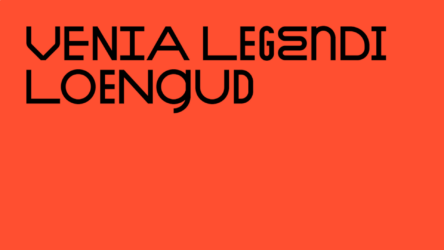
Public venia legendi lectures for candidates for the 2025 academic staff competition in May 2025.
NB! The password is G!cvas82
May 6
Venia legendi lectures for candidates for professor of Contemporary Art in the EKA main hall, A-101
13:00 Anu Vahtra “Making Space”
14:15 Merike Estna “Alive”
15:30 Craig Leonard “Instinctual Critique”
The lectures will be held in English.
May 8
Venia legendi lectures for candidates for professor of Photography in room A-501
13:00 Maria Kapajeva “Artist from the Borderlands: Between Questions and Connections, Experiments and Experiences”
14:15 Tuukka Kaila “Various Small Shifts”
15:30 Hanna Timonen “Photographic Explorations of the Everyday and Beyond”
The lectures will be held in English.
May 13
Lecture for associate professor candidate of the Center for Interior Architecture and General Theoretical Subjects in room A-501
15:00 Gregor Taul “Becoming Responsiv(bl)e”
May 14
Lecture for associate professor candidate of Social Design in room A-302
16:00 Daniel Kotsjuba “Designer in Public Service”
You are all welcome to listen!
Venia legendi Open Lectures: Competition for Academic Staff
Tuesday 06 May, 2025 — Wednesday 14 May, 2025

Public venia legendi lectures for candidates for the 2025 academic staff competition in May 2025.
NB! The password is G!cvas82
May 6
Venia legendi lectures for candidates for professor of Contemporary Art in the EKA main hall, A-101
13:00 Anu Vahtra “Making Space”
14:15 Merike Estna “Alive”
15:30 Craig Leonard “Instinctual Critique”
The lectures will be held in English.
May 8
Venia legendi lectures for candidates for professor of Photography in room A-501
13:00 Maria Kapajeva “Artist from the Borderlands: Between Questions and Connections, Experiments and Experiences”
14:15 Tuukka Kaila “Various Small Shifts”
15:30 Hanna Timonen “Photographic Explorations of the Everyday and Beyond”
The lectures will be held in English.
May 13
Lecture for associate professor candidate of the Center for Interior Architecture and General Theoretical Subjects in room A-501
15:00 Gregor Taul “Becoming Responsiv(bl)e”
May 14
Lecture for associate professor candidate of Social Design in room A-302
16:00 Daniel Kotsjuba “Designer in Public Service”
You are all welcome to listen!
29.04.2025
Textiles 110: Open Lecture by Päivi Vaarula “Material and Content, Working Together in textile Art”
Textiles 110: Open Lecture by Päivi Vaarula “Material and Content, Working Together in textile Art”
On April 29, at 5 p.m in room A501
Päivi Vaarula is a textile artist from Hämeenlinna, Finland. Her work is rooted in keen observation of everyday life, which she thoughtfully transforms into the visual language of textile art. Rather than seeking to entertain, she aims to create meaningful, thought-provoking works that often engage with present contemporary issues—particularly those related to the environment.
Vaarula works with local materials, traditional floor looms, and natural dyes, embracing sustainable practices in both concept and technique. For several years, she has been known for her distinctive three-dimensional woven surfaces, skillfully utilizing the expressive qualities of wool to bring depth and texture to her pieces.
Her art has been featured in over 70 group exhibitions and she has held 18 solo exhibitions, both in Finland and internationally. Alongside her artistic practice, Päivi Vaarula has worked as a full-time lecturer for more than 30 years. She has led lectures and workshops in numerous countries, including Finland, Denmark, Germany, Japan, Wales, Scotland, England, and Iceland.
Päivi Vaarula will talk about her textile journey and about her art.
Her solo exhibition “Entertainment” is also open at HOP gallery (Hobusepea tänav 2, Tallinn) until April 29th.
Textile 110 is a series of events celebrating the 110th anniversary of EKA’s textile design education, as part of which a series of open lectures focusing on textiles will be held, a series of publications will be published, and a selection of works from the EKA Museum’s textile collection can be seen throughout the year.
The lecture series opens up the spectrum of diverse opportunities in the field of textiles, both in design, industry, and creative practices, bringing out different roles and methods of creation in the field through various invited guests.
Supported by the Research Fund of EKA and the Cultural Endowment of Estonia
Textiles 110: Open Lecture by Päivi Vaarula “Material and Content, Working Together in textile Art”
Tuesday 29 April, 2025
Textiles 110: Open Lecture by Päivi Vaarula “Material and Content, Working Together in textile Art”
On April 29, at 5 p.m in room A501
Päivi Vaarula is a textile artist from Hämeenlinna, Finland. Her work is rooted in keen observation of everyday life, which she thoughtfully transforms into the visual language of textile art. Rather than seeking to entertain, she aims to create meaningful, thought-provoking works that often engage with present contemporary issues—particularly those related to the environment.
Vaarula works with local materials, traditional floor looms, and natural dyes, embracing sustainable practices in both concept and technique. For several years, she has been known for her distinctive three-dimensional woven surfaces, skillfully utilizing the expressive qualities of wool to bring depth and texture to her pieces.
Her art has been featured in over 70 group exhibitions and she has held 18 solo exhibitions, both in Finland and internationally. Alongside her artistic practice, Päivi Vaarula has worked as a full-time lecturer for more than 30 years. She has led lectures and workshops in numerous countries, including Finland, Denmark, Germany, Japan, Wales, Scotland, England, and Iceland.
Päivi Vaarula will talk about her textile journey and about her art.
Her solo exhibition “Entertainment” is also open at HOP gallery (Hobusepea tänav 2, Tallinn) until April 29th.
Textile 110 is a series of events celebrating the 110th anniversary of EKA’s textile design education, as part of which a series of open lectures focusing on textiles will be held, a series of publications will be published, and a selection of works from the EKA Museum’s textile collection can be seen throughout the year.
The lecture series opens up the spectrum of diverse opportunities in the field of textiles, both in design, industry, and creative practices, bringing out different roles and methods of creation in the field through various invited guests.
Supported by the Research Fund of EKA and the Cultural Endowment of Estonia
05.05.2025
SEMINAR Contemporary Higher Art Education: A Dialogue with the Future
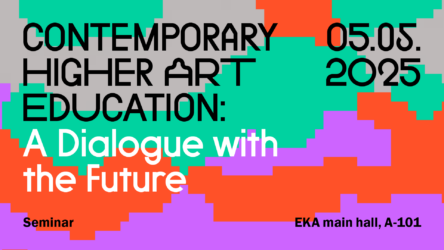
At the seminar ‘Contemporary Higher Art Education: A Dialogue with the Future,’ leaders from five Nordic art academies will share ideas and exchange perspectives. In addition, faculty members from the Faculty of Fine Arts at the Estonian Academy of Arts will discuss these challenges.
Advocating for art and art education has never been an easy task. This seminar focuses on key issues in contemporary higher art education here and now, at a time when critical thinking, ethical approaches and the independent power of art are more important than ever. The development of higher art education is closely connected with contemporary art movements – it’s not easy to say which influences the other more. Art must be able to engage with a vast range of phenomena and questions.
Art must maintain creative freedom, independence and autonomy, while also integrating more and more with other fields. A significant portion of contemporary art is exploring research-driven paths. In the education landscape, art education must offer comparability with research-based universities. Art and artists must manage themselves, communicate, and market their work. At the same time, art higher education must remain an attractive choice for the new generation. How can art academies offer all of this and meet these expectations?
PROGRAMME
11:30 –12:00 Coffee, Gathering and Welcome Words
12:00–12:20 – Maj Hasager (Rector of Malmö Art Academy) – Higher Art Education and the Political Gaze
12:20–12:40 – Jacob Jessen (Head of Department, Trondheim Academy of Fine Art) – Art and Research in the Creative University
12:40–13:00 – Kirke Kangro (Dean of Fine Arts Faculty, Estonian Academy of Arts) – Art Education between Freedom and Frameworks
13:00–13:20 – Coffee break
13:20–13:40 – Bjarki Bragason (Dean of Fine Art, Iceland University of the Arts) – environments in art education – a few thoughts
13:40–14:00 – Leevi Haapala (Dean of the Academy of Fine Arts, University of Helsinki) – Art Education and the Professional Art Field
16:00- 16:15 – Sum-up and closing words
Event will be held in English.
Please register to the seminar through the following link: https://forms.gle/wYxHjxZ8GiAiQkiWA
More info: Kati Saarits, kati.saarits@artun.ee
SEMINAR Contemporary Higher Art Education: A Dialogue with the Future
Monday 05 May, 2025

At the seminar ‘Contemporary Higher Art Education: A Dialogue with the Future,’ leaders from five Nordic art academies will share ideas and exchange perspectives. In addition, faculty members from the Faculty of Fine Arts at the Estonian Academy of Arts will discuss these challenges.
Advocating for art and art education has never been an easy task. This seminar focuses on key issues in contemporary higher art education here and now, at a time when critical thinking, ethical approaches and the independent power of art are more important than ever. The development of higher art education is closely connected with contemporary art movements – it’s not easy to say which influences the other more. Art must be able to engage with a vast range of phenomena and questions.
Art must maintain creative freedom, independence and autonomy, while also integrating more and more with other fields. A significant portion of contemporary art is exploring research-driven paths. In the education landscape, art education must offer comparability with research-based universities. Art and artists must manage themselves, communicate, and market their work. At the same time, art higher education must remain an attractive choice for the new generation. How can art academies offer all of this and meet these expectations?
PROGRAMME
11:30 –12:00 Coffee, Gathering and Welcome Words
12:00–12:20 – Maj Hasager (Rector of Malmö Art Academy) – Higher Art Education and the Political Gaze
12:20–12:40 – Jacob Jessen (Head of Department, Trondheim Academy of Fine Art) – Art and Research in the Creative University
12:40–13:00 – Kirke Kangro (Dean of Fine Arts Faculty, Estonian Academy of Arts) – Art Education between Freedom and Frameworks
13:00–13:20 – Coffee break
13:20–13:40 – Bjarki Bragason (Dean of Fine Art, Iceland University of the Arts) – environments in art education – a few thoughts
13:40–14:00 – Leevi Haapala (Dean of the Academy of Fine Arts, University of Helsinki) – Art Education and the Professional Art Field
16:00- 16:15 – Sum-up and closing words
Event will be held in English.
Please register to the seminar through the following link: https://forms.gle/wYxHjxZ8GiAiQkiWA
More info: Kati Saarits, kati.saarits@artun.ee
16.04.2025
Open Lecture: Pablo Hermansen “Counter Designing”
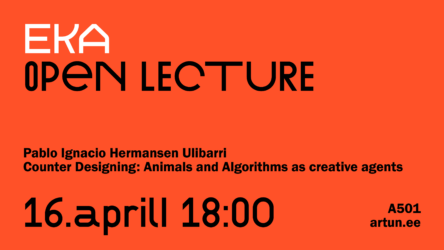
Pablo Ignacio Hermansen Ulibarri – Visiting Lecturer at the Estonian Academy of Arts
Pablo Ignacio Hermansen Ulibarri is a designer with a PhD in Architecture and Urban Studies. He teaches and conducts research at the School of Design at the Pontifical Catholic University of Chile. His work focuses on co-design, interaction design, socio-natural ecosystems, photo-ethnography, performative politics in public space, more-than-human prototyping, and public services as public space.
He will be visiting the Estonian Academy of Arts from April 14–16 and will give a public lecture, “Counter Designing: Animals and Algorithms as Creative Agents,” on April 16 at 18:00 in room A501.
In January, EKA Interaction Design students visited his university in Chile to develop collaborative projects and academic exchange.
Open Lecture: Pablo Hermansen “Counter Designing”
Wednesday 16 April, 2025

Pablo Ignacio Hermansen Ulibarri – Visiting Lecturer at the Estonian Academy of Arts
Pablo Ignacio Hermansen Ulibarri is a designer with a PhD in Architecture and Urban Studies. He teaches and conducts research at the School of Design at the Pontifical Catholic University of Chile. His work focuses on co-design, interaction design, socio-natural ecosystems, photo-ethnography, performative politics in public space, more-than-human prototyping, and public services as public space.
He will be visiting the Estonian Academy of Arts from April 14–16 and will give a public lecture, “Counter Designing: Animals and Algorithms as Creative Agents,” on April 16 at 18:00 in room A501.
In January, EKA Interaction Design students visited his university in Chile to develop collaborative projects and academic exchange.
07.04.2025 — 11.04.2025
CTC – Climate Truth Crisis Project
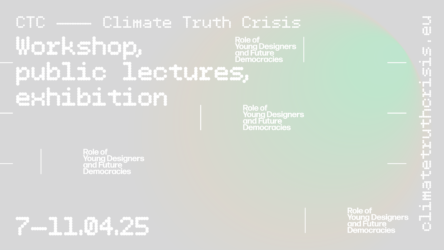
We look forward to seeing you at the opening of the CTC – Climate Truth Crisis exhibition on 11.04, at 14:00, in the open area in front of the Estonian Academy of Arts (Põhja pst 7).
The CTC – Climate Truth Crisis project deals with the spread of misinformation and understanding the climate crisis. The project involves educating young designers in these areas, creating a website that gathers information about the topic, publishing a podcast series, a dictionary and a collection of articles. In addition, students are visualizing the topic in various media. More information on the project website: https://www.climatetruthcrisis.eu/
The first workshop of the project will take place at the Estonian Academy of Arts on 7-11 April, during which students will write down concepts related to the topic, visualize them and on Friday, 11 April, open an exhibition in a public space in front of the EKA to introduce the topic to a wider audience.
The workshop is held in cooperation with the EKA Graphic Design Department and the Department of Semiotics of the University of Tartu. The students will be supervised by semioticians, conspiracy theory and disinformation researchers Mari-Liis Madisson and Daniel Tamm, Laura Vilbiks from the Estonian Foundation for Nature (ELF), and graphic designers Laura Merendi, Ott Kagovere and Kert Viiart. In addition to the supervisors, there will be students and lecturers from Bosnia, Spain, the Netherlands, England, Iceland and Lithuania.
In addition to the workshop, there will also be lectures open to the wider audience:
09.04, 16:00, A502 (EKA, Põhja pst 7)
Artist Kristina Õllek with a presentation Absorbing Hypoxic Water
10.04, 16:00, A300 (EKA, Põhja pst 7)
Graphic designer Maria Muuk with a presentation Graphic Design as a Degrowth Practice
The project will last for three years, 2025-2028, and workshops will be held at various partner universities:
Academy of Fine Arts Sarajevo,
Iceland University of the Arts,
Royal Academy of Art, The Hague,
University of the Arts London,
CTC – Climate Truth Crisis Project
Monday 07 April, 2025 — Friday 11 April, 2025

We look forward to seeing you at the opening of the CTC – Climate Truth Crisis exhibition on 11.04, at 14:00, in the open area in front of the Estonian Academy of Arts (Põhja pst 7).
The CTC – Climate Truth Crisis project deals with the spread of misinformation and understanding the climate crisis. The project involves educating young designers in these areas, creating a website that gathers information about the topic, publishing a podcast series, a dictionary and a collection of articles. In addition, students are visualizing the topic in various media. More information on the project website: https://www.climatetruthcrisis.eu/
The first workshop of the project will take place at the Estonian Academy of Arts on 7-11 April, during which students will write down concepts related to the topic, visualize them and on Friday, 11 April, open an exhibition in a public space in front of the EKA to introduce the topic to a wider audience.
The workshop is held in cooperation with the EKA Graphic Design Department and the Department of Semiotics of the University of Tartu. The students will be supervised by semioticians, conspiracy theory and disinformation researchers Mari-Liis Madisson and Daniel Tamm, Laura Vilbiks from the Estonian Foundation for Nature (ELF), and graphic designers Laura Merendi, Ott Kagovere and Kert Viiart. In addition to the supervisors, there will be students and lecturers from Bosnia, Spain, the Netherlands, England, Iceland and Lithuania.
In addition to the workshop, there will also be lectures open to the wider audience:
09.04, 16:00, A502 (EKA, Põhja pst 7)
Artist Kristina Õllek with a presentation Absorbing Hypoxic Water
10.04, 16:00, A300 (EKA, Põhja pst 7)
Graphic designer Maria Muuk with a presentation Graphic Design as a Degrowth Practice
The project will last for three years, 2025-2028, and workshops will be held at various partner universities:
Academy of Fine Arts Sarajevo,
Iceland University of the Arts,
Royal Academy of Art, The Hague,
University of the Arts London,
24.04.2025
Open architecture lecture: Taktyk
The 2025 Spring semester session of the Open Lectures ”City as novel ecosystem” focuses on landscape architecture and, more specifically, urban nature.
The lecture series is being put together by landscape architects Karin Bachmann, Merle Karro-Kalberg and Anna-Liisa Unt, who have co-founded and edited the landscape architecture magazine ÕU for 7 years and are currently leading the project “Curated Biodiversity”, which experiments with ways to make urban landscaping more diverse as an environment. Therefore, the open lectures in the spring will also turn their attention to the quality of the space between buildings and, using the speakers’ words and creations, show how to make the city more biodiverse and enjoyable and how people and other species that call the city their home can live in symbiosis.
On April 24 at 6 pm, Penfornis will take the stage in the EKA auditorium to introduce the 20-year practice of the landscape architecture office Taktyk, share the outcomes of he enquiries through design, point at critical future directions.
From Rotterdam to Barcelona, from Paris to Brussels and more lately Zurich, the practice Taktyk has since 2005, been envisaged as an evolving entity, adaptive and responsive to new heterogeneous and complex challenges. For the last 20 years Taktyk acts as a conductor, curator, and mediator of transformation processes using tacit knowledge of gardening, bricolage and painting. The lecture will highlight the emergence and evolution of our voice in the field and how we envision its future.
Taktyk is a landscape architecture office based in Paris and Brussels that experiments with introducing lush plant communities into existing spatial situations. The contrast between the natural and the built environment becomes very visible in their works, because special attention is given to creating new spatial quality that arises from the overlap between the two. New environments are always born from coworking with future users.
The lectures are intended for all disciplines, not only for students and professionals in the field of architecture.
All lectures are held on Thursdays at 6 pm in the EKA main auditorium. All lectures are in English and free of charge.
Schedule of the Spring 2025 lectures:
March 27. Toposcape:
April 3. Ingo Kowarik
April 10. Jan van Schaik
April 24. Taktyk
Within the framework of a series of open lectures, the Faculty of Architecture of EKA presents a dozen unique practitioners and valued theorists in the field in Tallinn every academic year.
The lecture series is supported by the Cultural Endowment of Estonia.
www.avatudloengud.ee
Open architecture lecture: Taktyk
Thursday 24 April, 2025
The 2025 Spring semester session of the Open Lectures ”City as novel ecosystem” focuses on landscape architecture and, more specifically, urban nature.
The lecture series is being put together by landscape architects Karin Bachmann, Merle Karro-Kalberg and Anna-Liisa Unt, who have co-founded and edited the landscape architecture magazine ÕU for 7 years and are currently leading the project “Curated Biodiversity”, which experiments with ways to make urban landscaping more diverse as an environment. Therefore, the open lectures in the spring will also turn their attention to the quality of the space between buildings and, using the speakers’ words and creations, show how to make the city more biodiverse and enjoyable and how people and other species that call the city their home can live in symbiosis.
On April 24 at 6 pm, Penfornis will take the stage in the EKA auditorium to introduce the 20-year practice of the landscape architecture office Taktyk, share the outcomes of he enquiries through design, point at critical future directions.
From Rotterdam to Barcelona, from Paris to Brussels and more lately Zurich, the practice Taktyk has since 2005, been envisaged as an evolving entity, adaptive and responsive to new heterogeneous and complex challenges. For the last 20 years Taktyk acts as a conductor, curator, and mediator of transformation processes using tacit knowledge of gardening, bricolage and painting. The lecture will highlight the emergence and evolution of our voice in the field and how we envision its future.
Taktyk is a landscape architecture office based in Paris and Brussels that experiments with introducing lush plant communities into existing spatial situations. The contrast between the natural and the built environment becomes very visible in their works, because special attention is given to creating new spatial quality that arises from the overlap between the two. New environments are always born from coworking with future users.
The lectures are intended for all disciplines, not only for students and professionals in the field of architecture.
All lectures are held on Thursdays at 6 pm in the EKA main auditorium. All lectures are in English and free of charge.
Schedule of the Spring 2025 lectures:
March 27. Toposcape:
April 3. Ingo Kowarik
April 10. Jan van Schaik
April 24. Taktyk
Within the framework of a series of open lectures, the Faculty of Architecture of EKA presents a dozen unique practitioners and valued theorists in the field in Tallinn every academic year.
The lecture series is supported by the Cultural Endowment of Estonia.
www.avatudloengud.ee
15.04.2025
Contemporary Art and Context: Maria Lalou & Skafte Aymo-Boot
Maria Lalou & Skafte Aymo-Boot
→ Lecture performance: [UN]FINISHED
→ Screening: Barbaresou Legacy, or The Cursed One, 2024
→ Book presentation: [UN]FINISHED – Atlas of Athens’ Incomplete Buildings – A Story of Hidden Antimonuments (Jam Sam Books, 2023)
The architectural archetype of the unfinished concrete building can be found everywhere in the Athenian cityscape. Those structures, left in the middle of a discontinued building process in a seemingly never-ending pause, are signs of invisible financial and political forces defining the physical appearance of the city. With its character of a ruin of a forgotten purpose the unfinished building is at the same time pointing to the past and to the future, as a frozen moment of time preserved ever since its volume reached that concrete state. The unfinished concrete skeletons of Athens are keepers of stories that are evidence of unseen structures that form the Greek society: family, bureaucracy, and finance. The work of Lalou & Aymo-Boot makes apparent how these ever-present factors continuously influence the everyday of the city and its inhabitants.
The full story of Barbaresou Legacy, or The Cursed One is included as one of the chapters in the book [UN]FINISHED – Atlas of Athens’ Incomplete Buildings – A Story of Hidden Antimonuments by Maria Lalou & Skafte Aymo-Boot, published in 2023 by Jap Sam Books.
Maria Lalou is a Greek conceptual sculptor and experimental filmmaker. Her work focuses on the politics of the viewer in the form of installations, performances, filmic documents and publications. She has presented her work internationally in exhibitions, screenings and lectures and published two monographs: [theatro] (Onomatopee, 2015) and the camera (Dolce Publications, 2019).
Skafte Aymo-Boot is a Danish architect with an independent design and research practice. He has realised a variety of permanent and temporary works in Europe and Asia, many of which are the result of collaborations with artists operating in the overlap between architecture and visual art. He is also a partner at the architectural office OP – Open Platform in Copenhagen.
Since 2012, Lalou & Aymo-Boot have worked together on [UN]FINISHED, their continuous research on the unfinished concrete buildings of Athens. In 2020, they founded cross section archive in Athens, a space for art and architecture, exploring urban phenomena that occur in the intersection of those disciplines and how historical facts, political structures and everyday circumstances have been interfering with, forming, and directing them. They curate an annual thematic program of research and exhibitions, inviting artists, architects and thinkers to collectively investigate and expand the theme at stake, and publish the zine Document.
Contemporary Art and Context is a lecture series hosted by MA Contemporary Art and features talks by artists, curators, and researchers, offering diverse perspectives on contemporary art practices and their societal contexts.
The lecture takes place in English, everyone is welcome to join!
Contemporary Art and Context: Maria Lalou & Skafte Aymo-Boot
Tuesday 15 April, 2025
Maria Lalou & Skafte Aymo-Boot
→ Lecture performance: [UN]FINISHED
→ Screening: Barbaresou Legacy, or The Cursed One, 2024
→ Book presentation: [UN]FINISHED – Atlas of Athens’ Incomplete Buildings – A Story of Hidden Antimonuments (Jam Sam Books, 2023)
The architectural archetype of the unfinished concrete building can be found everywhere in the Athenian cityscape. Those structures, left in the middle of a discontinued building process in a seemingly never-ending pause, are signs of invisible financial and political forces defining the physical appearance of the city. With its character of a ruin of a forgotten purpose the unfinished building is at the same time pointing to the past and to the future, as a frozen moment of time preserved ever since its volume reached that concrete state. The unfinished concrete skeletons of Athens are keepers of stories that are evidence of unseen structures that form the Greek society: family, bureaucracy, and finance. The work of Lalou & Aymo-Boot makes apparent how these ever-present factors continuously influence the everyday of the city and its inhabitants.
The full story of Barbaresou Legacy, or The Cursed One is included as one of the chapters in the book [UN]FINISHED – Atlas of Athens’ Incomplete Buildings – A Story of Hidden Antimonuments by Maria Lalou & Skafte Aymo-Boot, published in 2023 by Jap Sam Books.
Maria Lalou is a Greek conceptual sculptor and experimental filmmaker. Her work focuses on the politics of the viewer in the form of installations, performances, filmic documents and publications. She has presented her work internationally in exhibitions, screenings and lectures and published two monographs: [theatro] (Onomatopee, 2015) and the camera (Dolce Publications, 2019).
Skafte Aymo-Boot is a Danish architect with an independent design and research practice. He has realised a variety of permanent and temporary works in Europe and Asia, many of which are the result of collaborations with artists operating in the overlap between architecture and visual art. He is also a partner at the architectural office OP – Open Platform in Copenhagen.
Since 2012, Lalou & Aymo-Boot have worked together on [UN]FINISHED, their continuous research on the unfinished concrete buildings of Athens. In 2020, they founded cross section archive in Athens, a space for art and architecture, exploring urban phenomena that occur in the intersection of those disciplines and how historical facts, political structures and everyday circumstances have been interfering with, forming, and directing them. They curate an annual thematic program of research and exhibitions, inviting artists, architects and thinkers to collectively investigate and expand the theme at stake, and publish the zine Document.
Contemporary Art and Context is a lecture series hosted by MA Contemporary Art and features talks by artists, curators, and researchers, offering diverse perspectives on contemporary art practices and their societal contexts.
The lecture takes place in English, everyone is welcome to join!

